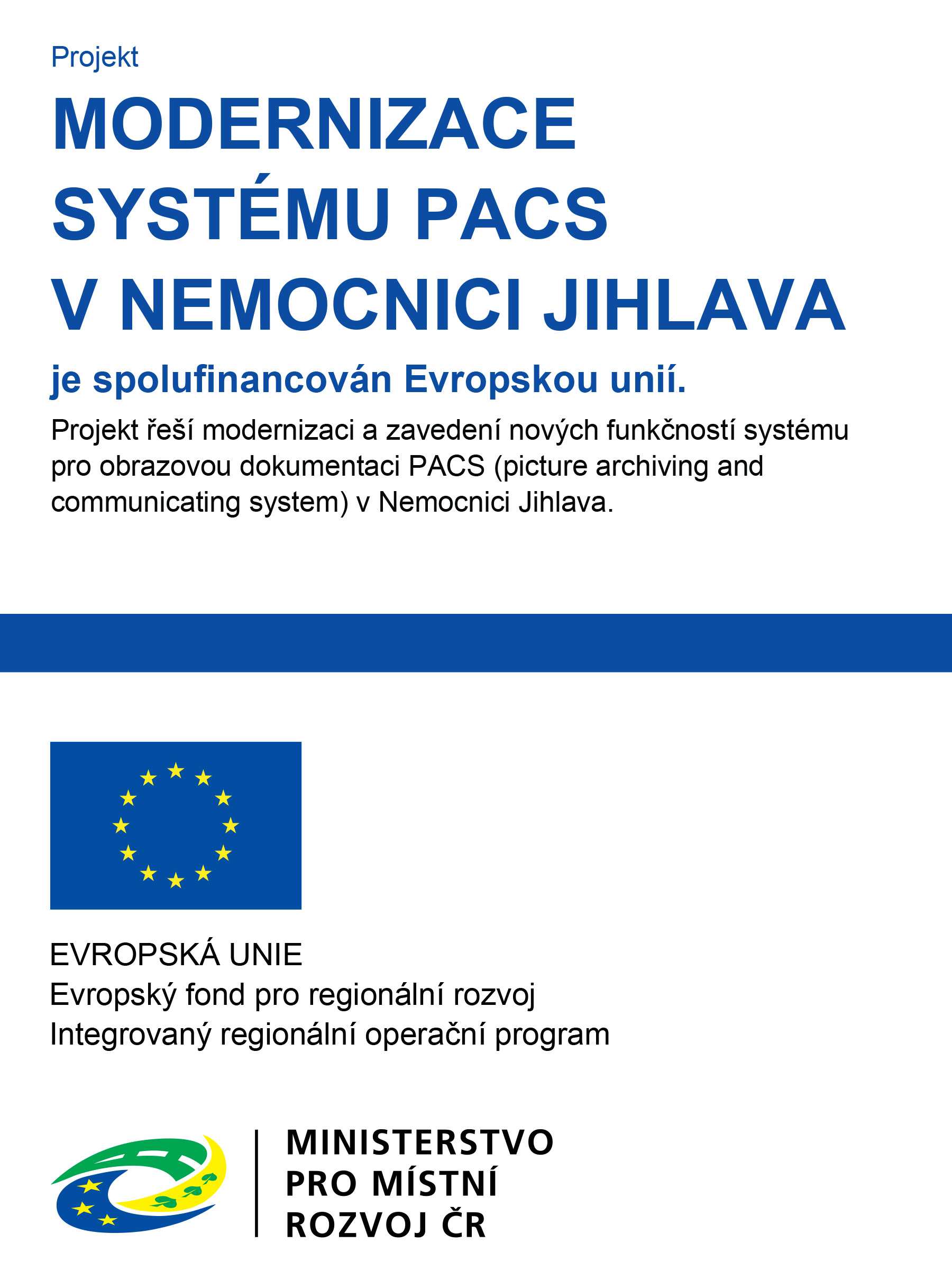About Hospital
European funds
European funds
Posílení onkologické prevence a péče Nemocnice Jihlava
Projekt je financován Evropskou unií.
Cílem projektu je modernizace zdravotnické techniky a technologií v oblasti poskytování vysoce specializované onkologické péče v rámci Komplexního onkologického centra Nemocnice Jihlava za účelem rozvoje precizní a personalizované medicíny zahrnující včasnou diagnostiku, cílenou léčbu a personalizovanou podpůrnou péči.

Rozvoj eHealth Nemocnice Jihlava
Projekt je financován Evropskou unií.
Předmětem projektu je vytvoření Portálu pacienta a úprava stávajících informačních systémů Nemocnice Jihlava tak, aby umožnily interoperabilní výměnu, sdílení a bezpečné uložení zdravotnické dokumentace.

Development of laboratory capacities of the Hospital Jihlava
The project is co-funded by the European Union as a part of the Union's response to the COVID-19 pandemic.
The aim of the project is to develop, modernise and strengthen the resilience of the Jihlava Hospital's healthcare, in particular the renewal of the laboratory complement equipment to minimise the impact of the COVID 19 pandemic on patients and hospital staff, and to prepare for other potential threats.
The project supports the equipment and development of laboratory diagnostics for the entire laboratory complement of the hospital. In times of infectious disease pandemics, the demands for rapid and high-quality diagnostics across all disciplines of laboratory complement are increasing exponentially. Another significant factor is the need to minimize the risks of infectious disease transmission and the resulting requirements and division of operations, where everything must be strictly segregated to eliminate risks.

Increasing cyber security of Hospital Jihlava
Within the implementation of the project plan, the applicant plans to implement cyber security measures in the following areas according to Decree No. 82/2018 Coll. (Decree on Cyber Security):
- An instrument to protect the integrity of communication networks - the security of communication networks (§ 18).
- An instrument for ensuring the level of availability of information - ensuring the level of availability of information (§ 27).
Project focus
- To increase the security of the network at its perimeter.
- To improve the backup level.
- To increase the availability of virtualization infrastructure.
Project objectives
The main objective of the project is to increase cyber security and meet the requirements of Act No. 181/2014 Coll., on Cyber Security and on Amendments to Related Acts (Cyber Security Act), i.e. to increase the security of listed information and communication systems.
The project is implemented thanks to the financial support of the European Union.

Modernization and renewal of oncogynecological care equipment at the Hospital Jihlava
The aim of the project was to increase the quality, accessibility and safety of care for cancer patients in the Vysočina region, which is provided in the Comprehensive Oncology Centre of the Jihlava Hospital and consequently within the Oncogynecology Centre. Within the project, the workplaces of surgery rooms, ultrasound diagnostics, imaging methods department were equipped, which will have a significant effect on improving the diagnosis, treatment and dispensation of cancer patients with an impact on the prevention of cancer diseases. The project deals with the retrofitting or renewal of the instrumentation of the departments involved in the provision of oncogynaecological care within the oncogynaecological and complex oncology centre, from the diagnosis of tumours, through the treatment of cancer both surgical and by means of other techniques (radiotherapy, chemotherapy, hormone therapy, with subsequent dispensation (regular checks including laboratory tests and imaging methods) of these patients).
For genetically determined tumours, dispensation and targeted prevention of the families of these patients. In the preparatory phase of this project, the needs of the various departments involved in this highly specialised care were mapped. The existing conditions of these departments were surveyed and their involvement in the care of patients with cancer was evaluated both in terms of the development plans of the Vysočina Region and the Hospital Jihlava as the guarantor of this specialty. The set parameters were evaluated in terms of current and estimated standards of care for cancer patients. The following subunits were identified as the departments with the greatest need for development and with a high impact on efficiency within the Hospital Jihlava and the Comprehensive Oncology Centre: gynaecology department, ultrasound department, operating theatres, imaging department and oncology department. The activities of the project therefore involved the modernisation and renewal of these subunits, the modernisation of diagnostic and therapeutic medical devices whose physical and moral ageing makes it impossible to achieve standard parameters of quality of care and whose acquisition will lead to ensuring the diagnosis, treatment and detection of oncological diseases and the management of their complications. Thus, the implementation of the project contributes significantly to leveling out the differences in the provision of health services for women with cancer between individual centres and at the same time to ensuring effective cooperation between health care facilities of different medical levels.
OVERVIEW OF THE EQUIPMENT PURCHASED
DIAGNOSTIC COMPLEMENT
- Ultrasound device (HIGH-END with 3D/4D technology).
- Magnetic resonance 1.5T + equipment.
AMBULANCE AND COMPLEMENT
- Gynecological examination chair.
- Surgical Instrument Washing Machine (SR).
EQUIPMENT FOR SURGERY ROOMS
- Instrumentation for vaginal surgery.
- Instrumentation for hysteroscopic surgery.
- Mobile operating table, electrically adjustable.
- Laparoscopic tower HIGH-END tyou (FULL HD camera).
- Operating lamp with LED technology and two arms.
- Technology to detect sentinel nodes.

Modernizace systému PACS v Nemocnici Jihlava
Projekt řeší modernizaci a zavedení nových funkčností systému pro obrazovou dokumentaci PACS (picture archiving and communicating system) v Nemocnici Jihlava.

Development of care for patients at risk in the Hospital Jihlava - Comprehensive Oncology Centre
The project is co-funded by the European Union as a part of the Union's response to the COVID-19 pandemic.
The aim of the project is to modernize medical equipment and technologies in the field of providing highly specialized oncological care in order to develop, improve the resilience and readiness of the Jihlava Hospital with regard to the pandemic situation and other potential threats in the future. In particular, the project aims to enhance the accessibility, quality and safety of the oncology department for patients and staff. Another objective of the project is to reduce morbidity, mortality and socio-economic impact of COVID-19 and to support care for particularly vulnerable patient groups. The implementation of the project and its objectives thus directly meet REACT-EU specific objective 6.1.
Acquired equipment overview
- A linear accelerator,
- a brachytherapy irradiator,
- a CT stimulator,
- verification system,
- Eclypse planning system,
- dosimetry system.

Development and modernization of health care at Hospital Jihlava - Diagnostic complement
The project is co-funded by the European Union as a part of the Union's response to the COVID-19 pandemic.
The aim of the project is to develop, modernise and strengthen the resilience of the Jihlava Hospital's healthcare, in particular the renewal of diagnostic facilities and related equipment to provide timely, quality and safe care, minimise the impact of the COVID 19 pandemic on patients and hospital staff, and prepare for other potential threats. The project is being implemented under the 98. REACT call, European Regional Development Fund.
Overview of the equipment acquired in Phase I and Phase II of the project
- Monitoring system for the intensive care including a central monitor,
- monitoring system for the recovery room,
- a fibrobronchoscope,
- medical equipment for intensive care,
- an ultrasound machine for the cardiology department,
- 200 pcs of LCD monitors,
- specialized ultrasound for surgical disciplines,
- pulmonary ventilators,
- infusion technique,
- monitoring system for ARU including a central monitor.

Development and modernization of health care at Hospital Jihlava - Surgery and emergency medicine
Development and modernization of health care at Hospital Jihlava - Diagnostic complement
The project is co-funded by the European Union as a part of the Union's response to the COVID-19 pandemic.
The aim of the project is to develop, modernise and strengthen the resilience of the Hospital Jihlava's healthcare, in particular the renewal of surgery rooms and central sterilisation equipment, minimising the impact of the COVID 19 pandemic on patients and hospital staff, and preparedness for other potential threats.
The project deals with the modernisation and development of urgent acute health care provided at Hospital Jihlava. The needs of individual departments providing diagnostics, surgery and treatment in relation to emergency care are evaluated continuously in the context of the hospital's long-term plans. The development is related to the newly defined parameters of care, especially for patients with COVID 19, and the modernisation is mainly related to the ever-increasing standards of equipment for individual specialised departments.
The departments with the highest potential for development and high impact on the efficiency and quality of acute care were selected in accordance with the programme of the call as operating theatres and central sterilisation, anaesthesiology and resuscitation department and central radiodiagnostic department. The existing equipment of these key facilities is already considerably worn out physically and morally, does not allow to achieve a standard or higher level of quality of care and complicates the operation. The technology is unable to cover the current demands for comprehensive anaesthetic care, and the radiodiagnostic equipment acquired in 2000, 2005, 2007 and 2009 is inadequate, both in terms of quality of output and throughput, which appears to be essential in the context of COVID 19 treatment. The project is being implemented within the framework of the 98th COVIDID II project. REACT, European Regional Development Fund.

Improving the quality of follow-up care at Jihlava Hospital
Project under the 31st IROP Call for proposals
Improving the quality of follow-up care at Jihlava Hospital
The project addresses the quality of follow-up care provided at the Hospital Jihlava, which immediately precedes or directly follows the highly specialized care provided both in the accredited centres of the Hospital Jihlava (the Comprehensive Oncology Centre, the Cardiovascular Centre, the Ict Centre and the Onco-gynaecology Centre) and in other highly specialized centres in the region (the trauma centre at the Hospital Brno Bohunice). In the preparatory phase of this project, the needs of individual departments providing follow-up care were mapped and their necessity was evaluated in the context of the hospital's development plans and in relation to the defined follow-up care parameters and equipment standards of individual specialised departments. The departments with the highest potential for development and high impact on the efficiency and quality of follow-up care provided at the Hospital Jihlava were identified as the departments of laboratories, rehabilitation and physical medicine, the endoscopy department, operating theatres, emergency reception (the hospital does not have its own trauma centre) and follow-up intensive care and long-term intensive nursing care. The project activities will modernize and renew the bed stock and laboratory, diagnostic and therapeutic medical equipment, whose physical and moral wear and tear does not allow to achieve standard parameters of quality of care and whose acquisition will lead to ensuring diagnostics, treatment and detection of early stages of diseases as well as their complications. The implementation of the project will therefore significantly contribute to the levelling of differences in the provision of follow-up care services between individual health care facilities and at the same time to ensuring effective cooperation between health care facilities of different medical levels.
The project will improve the quality of follow-up care at the following six sites:
- Laboratories.
- Rehabilitation and physical medicine.
- Endoscopic workplace.
- Surgery rooms.
- Emergency Department
- Follow-up intensive care and long-term intensive nursing care.
Thanks to the implementation of the project, the diagnosis of life-threatening conditions, especially serious bacterial infections, sepsis, the extension of haematological diagnostics, especially for cancer conditions, and the expansion of the range of diagnostic imaging and therapeutic methods for oncology patients are accelerated. The use of advanced imaging methods that will be acquired within the project will enable the detection of tumour changes in the early stages of the disease, and endoscopes with high-resolution optics will make colorectal cancer screening more effective. The project will also improve safety in the provision of medical care by upgrading technologies for the surgical management of pathological conditions, particularly in onco-surgery, oncogynaecology, oncourology and vascular surgery. After treating patients in highly specialised care centres, the project will also significantly improve the outcomes of follow-up rehabilitation care and increase the comfort and service levels in aftercare and long-term rehabilitation beds.







